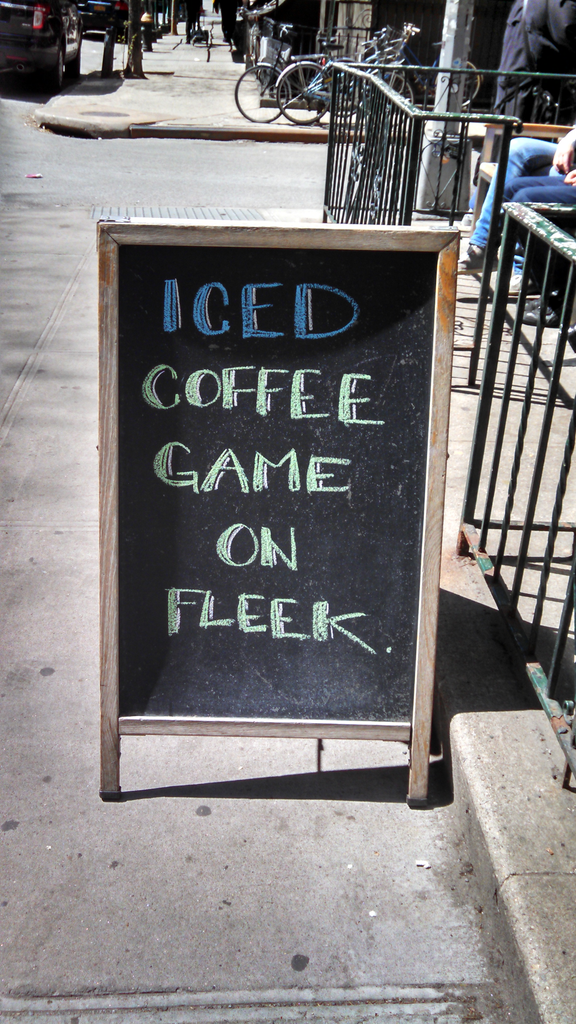“There is alcohol in this establishment. You love alcohol!”
These words recently greeted me from a chalkboard sign at a bar a few blocks away from my apartment. The sheer cheekiness nearly knocked me over. If I’d been about to enter that bar, I might have turned on my heels and walked away. The commercialism mixed with annoying solicitousness mixed with elbow-in-ribcage jokiness—it all felt so familiar. When did bar and café chalkboards start reading like some kind of cross between a pick-up line, “neg,” and Internet meme?
Long after the printing press rendered town criers obsolete, that other ancient form of information dissemination, the sidewalk sandwich board, quietly persists. Sometimes these chalkboards—you can find them standing outside certain not-corporate-and-proud-of-it businesses like bars, coffee shops, and boutiques—list the day’s specials or when happy hour is. But perhaps you too have lately noticed a certain creep away from the practical toward a softer sell: jokes, puns, quotations, drawings, and other creative expressions of branding. Too often, the results are cringeworthy.
You could say it all started with “Espresso yourself!” A couple of weeks ago, I walked by a coffee shop with this written on a sign outside it. Underneath, in smaller letters: “Don’t represso yourself!” It was clear then that there was only one thing in need of being repressoed, and it was those jokes. But once I started paying more attention to café signage, “Espresso Yourself” began to seem like one of the better ones: Its on-topicness alone gave it a leg up on many of the others I encountered. Outside a wine shop, puzzlingly: “Whatever you do, give 100%. Unless you’re giving blood.” There was this koanlike imperative outside one café: “Don’t be eye candy, be soul food.” A little bossy for a chalkboard, no? Outside a laundromat, of all places: “Life’s a ‘bleech’ and then you ‘dye.’ ” At a Mexican restaurant: “In queso emergency, we are here for you.” By a cheese shop (what is it about cheese and puns?): “Sweet dreams are made of cheese, who am I to dis a brie?” Next to one Brooklyn bar, presumably celebrating the life of Leonard Nimoy, was a chalk drawing of his Star Trek character and the words “Our beer really ‘hits the spock.’ ”
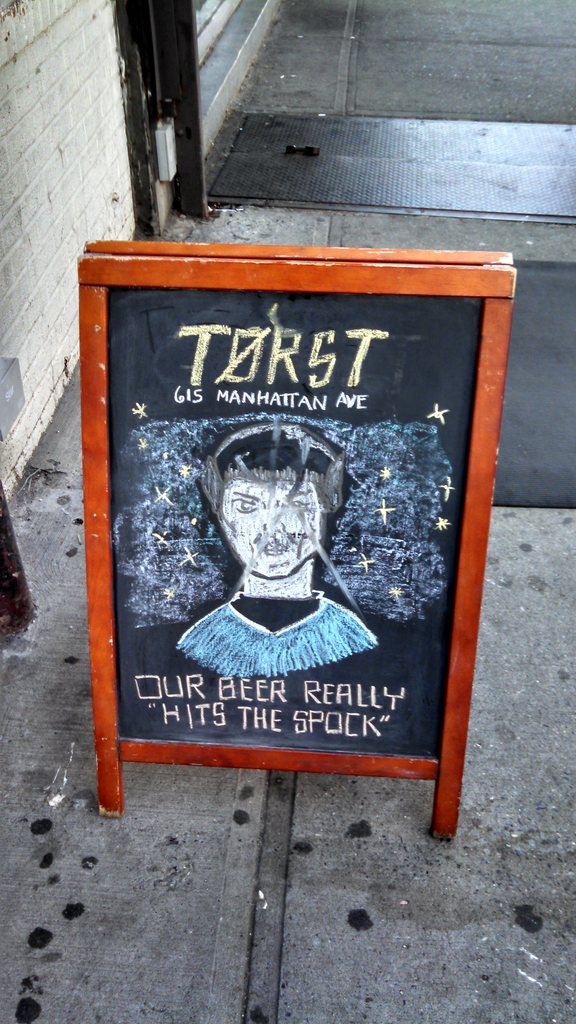
Photo by Heather Schwedel
Wondering if I was the only crank who found these signs aggressively unnecessary, I took to the Internet in search of sympathizers. I found plenty. “I think what irks me in general about these signs is just the overfamiliarity,” emailed Chiara Atik, a playwright and writer who has tweeted her ire for these signs. “Like I just want a coffee, not some timely allusion to last night’s Game of Thrones.” The strategy of attracting attention through clever signage may even be backfiring, resulting not in additional business but eye rolls. (From me anyway. I acknowledge the possibility that some people read these signs, laugh heartily, and happily hand over their dollars.)
So how did we come to this? Robert Norman, the communications director for Think Coffee—a chain with several Manhattan locations that has been known to dabble in chalkboard jokes—said that the signs at each of his company’s stores are left up to employee discretion: “From store to store, there’s no mandate about what you have to say.” The only requirement is that the signs have something to do with the Think brand or coffee in general. Norman too has noticed that not all of his fellow coffee shops share his commitment to staying on message. “Some places focus too hard on barista jokes,” Norman said. “I saw one a little while ago that was like, ‘Happy hour from 5 to 6. That’s the only hour our baristas will be happy. Sorry you missed it.’ ” Actually, I’m not.
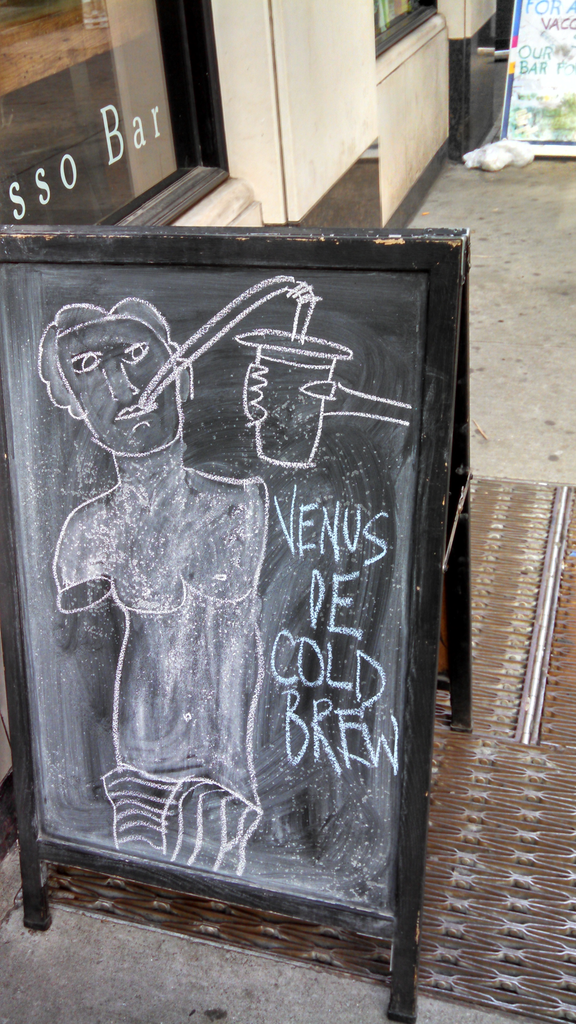
Photo by Heather Schwedel
Lack of originality is another turn-off. How many signs reading “Free Beer” in big letters have you seen that turn out to say “Free Wifi, Cold Beer” when you look closer? “I think I’ve seen ‘IRL Tinder’ on at least four different signs outside bars,” lamented Katie Heaney, a writer for BuzzFeed and a friend of Atik’s who has joined her in hate-tweeting examples of offending signs. “I can’t think of many things I want less in a bar than for it to resemble the shitshow I’m subjected to any time I go on Tinder,” she added.
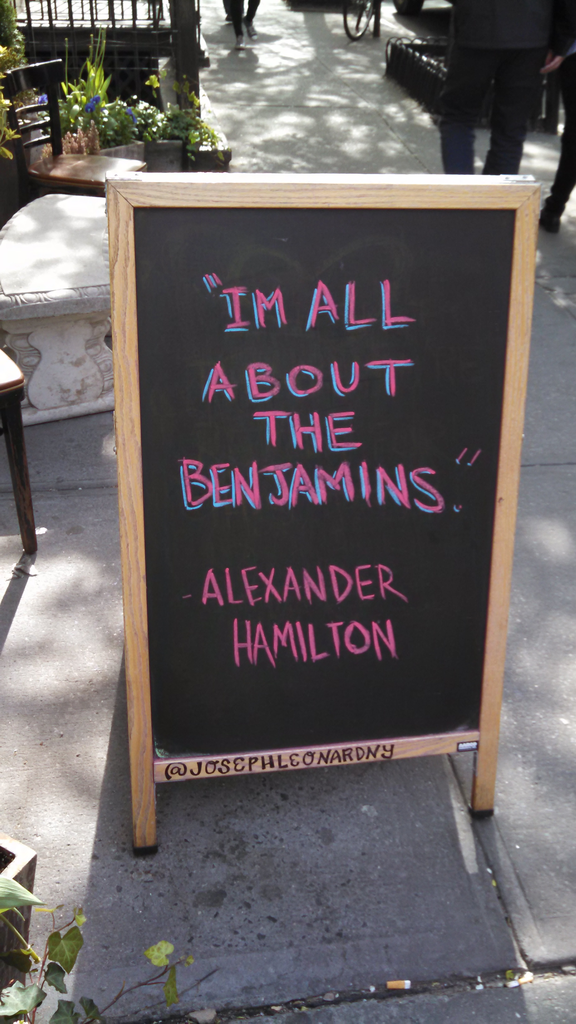
Photo by Heather Schwedel
There’s also a whole category of sign that seems to think it’s being funny but isn’t actually making a joke at all. Like this faux quote outside a trendy Manhattan restaurant: “ ‘I’m all about the benjamins.’ –Alexander Hamilton.” Or the drawing of TV character Kimmy Schmidt at a West Village ice cream shop along with the headline “Unbreakable Salty Pimp.” We can discuss dessert-naming conventions another time—“Salty Pimp” is one of the shop’s specialties—but while adding the word unbreakable to the name of a menu item to invoke a TV show is indeed joke-shaped, this does not actually a joke make. It’s enough to make you relish the simplicity of signs that advertise new menu offerings or say things like “Garden open!”
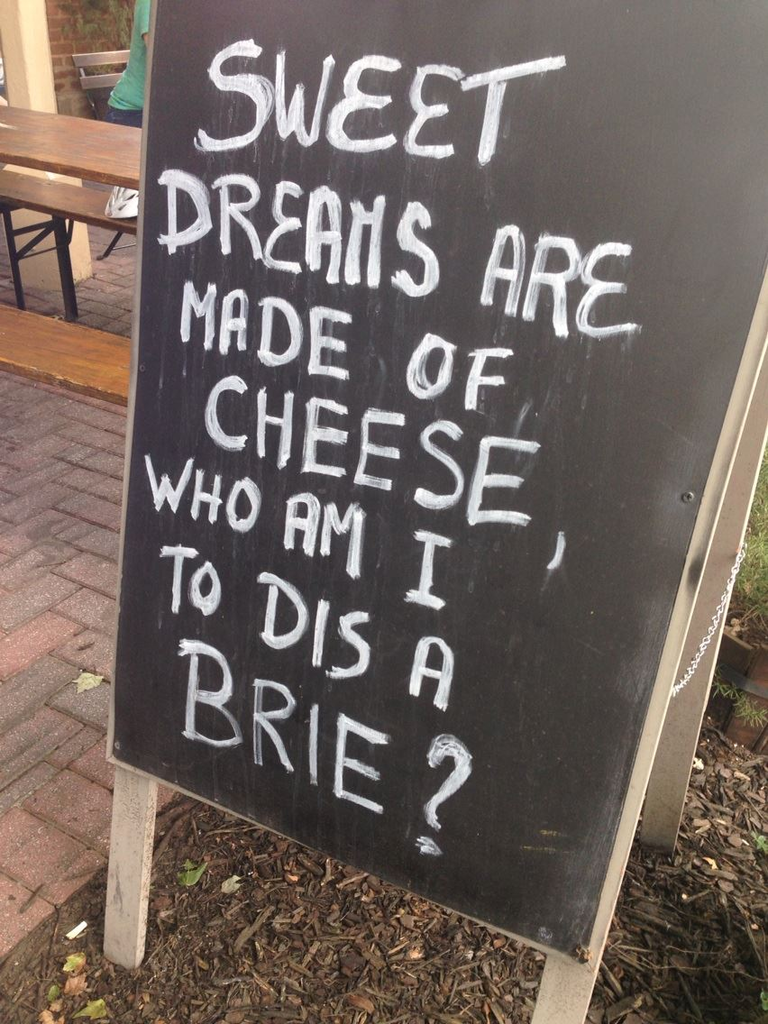
Photo by Holly Allen
Another recurring trope is the social media slang–infused sandwich-board message. I’m talking about “Our iced coffee game is on fleek” and its ilk. Here we see the connection between old modes of distributing information and the new: What is Twitter if not a modern, more virulent spin on the sandwich board? Robert Norman of Think confirmed that he asks stores to change their signs every day or so (unless a sign is performing particularly well on Instagram, of course). Some cafés take it upon themselves to come up with different messages for each side of the sandwich board, thus doubling their challenge. These days, Atik said, “being funny and pithy is rewarded with likes and retweets and attention—I guess dining establishments wanted in.” And just as with social media, those with little to say may resort to writing total nonsense.
